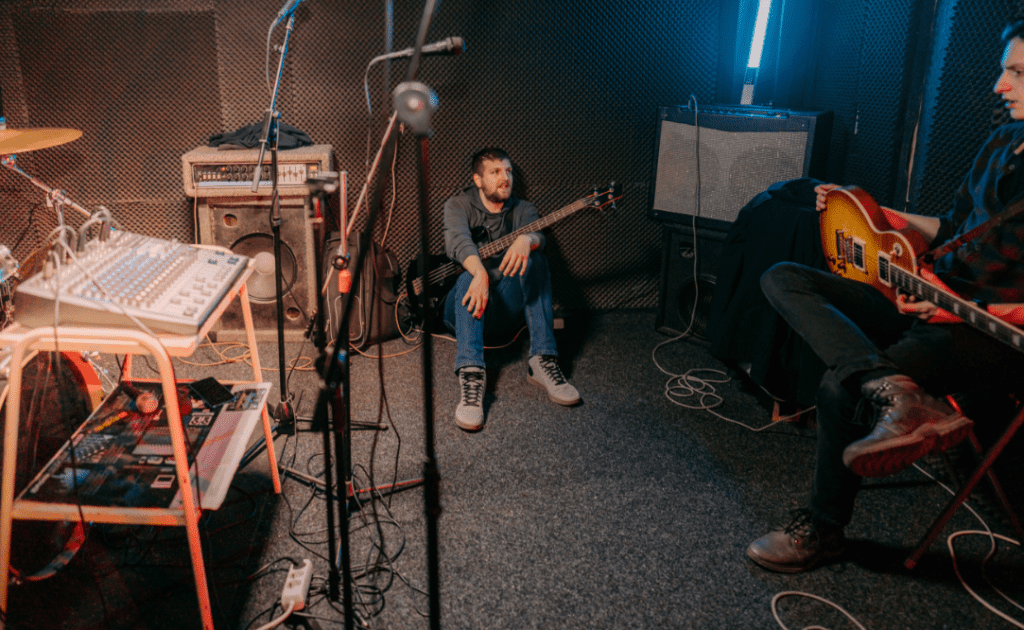It is already a challenge to get all the members together for band practice, and going home afterward can be really frustrating and annoying if you didn’t progress as well as you intended to. Therefore it is key to have a few goals in place which is communicated and agreed on before practice so that you can optimize the time together.
Keeping a record of each band practice, including the goals reached and songs practiced will help you optimize your time together. This should be agreed on before each practice session by all the members to enhance cooperative goal achievement.

Let’s discuss the key aspects to optimize your time together and get the most out of your time.
Set achievable goals for each session
Whether this might be to practice a song to performance level or sorting out certain song arrangements, it is important to stay detailed and fine-tune your practices by setting goals that you all believe are achievable.
I wouldn’t set more than 3 goals per session, just because either the time or the quality might suffer from trying to achieve too much in a short space of time.
Remember that you can not set goals for someone else. It is crucial that all the members agree on the set goals. For example, if your goal is to play on “click” and fine-tune rhythm issues, the drummer should mainly be ready for this and not the rest of the band requesting something from him that is not yet realistically achievable.
Every goal achieved should be celebrated!
#thesmallthings
Keeping a record of all your practices
Having a band book is a big part of staying on track. Sitting together before practice for 5 minutes is key to staying focused on the goals at hand. This could also be done with a message before practice or directly after the previous practice (which allows members to practice pieces and prepare themselves mentally). It is just important that all members agree on this either verbally or symbolically.
Write these goals in your book and check them off afterward. It might be that some points needed more time to practice, and this is fine. As long as you can see progress and be proud of the small steps you achieve with your group.
Here’s a suggested band practice entry:
| Date | Duration | Venue | Goals | Goals achieved | What to work on | Goals for the next session |
| XX.X | 2 hours | XXX | 1. 2. 3. | Check check Not achieved | Lead solo… Bass riff… Drum outro… | 1. 2. 3. |
Here you can see a clear layout of where you invest your time. The “Goals for next session” can also be written in the “Goals set” column immediately to save some time.
This is a very goal-driven method. Remember to stay balanced and be open to change along the way. Nothing is ever set in stone and the wellness of your members should enjoy preference.
Build on your musical repertoire
It is so easy to lose track of what songs you have performed in the past. Your goal is to build your song repertoire and build your collection of music that you are able to perform. It is so easy to forget the creative covers and cool songs you spend a lot of time on in band practice and performing as the years go by. These songs should be documented in your book as well as the set lists you used for each gig.
At the backside of your book, make a list of each song your band has practiced to performance level. Add the root notes or chords to it for a reminder.
Another method of keeping a record of your music is to add it to a device where you can record an example version, add voice notes and scan paperwork in. To keep it central, I would suggest saving it all to a cloud for all members to have access to.
Having a band practice routine
As humans, routines give us security and stability. We thrive on knowing what to expect, and it brings the best out of us. Therefore a band routine offers the comfort zone that we need to perform at our best. It offers us the chance to be mentally prepared and to get ready to deliver.
I’ve planned out a 2-hour practice session for you with potential breaks and reflection included. It also explains more about how often you should practice with your band. Have a read-through and see if it can guide you to a bit of structure for your practices.
Having open communication within the band
A great vibe and team spirit can get you far. Keeping your bandmates positive and motivated helps you achieve your goals faster and easier. A task that might seem to be challenging can be accomplished when the band works together and is not affected by one another, because they feel that they are in a respectful and trusted environment.
It is normal for bands to go through phases of conflict. And I also know that it is time-consuming to get it solved. But it is worth it. Sometimes, taking a step backward can mean taking many more steps forward again.
If you are experiencing conflict within your band, don’t miss the article I wrote about how to deal with conflict and get it solved.
Have a band rehearsal etiquette
When a group of people comes together, they all have different habits and ways of doing things. Some smoke and some do not. Some are more goal orientated and others are more focused on the fun and enjoyment aspect. We are all different from each other, with one main common goal: to achieve greatness with the band.
That’s why it is really important to have a few general agreements in place for everyone to see what is expected of them. These are usually a few rules that are agreed upon by all the members to follow during band practice. It’s a situation of giving and taking. We need to look at the needs of everyone and make sure everybody is happy and comfortable performing at their best.
If you are looking for a few tips, don’t miss the post I wrote about setting up band rehearsal etiquette everyone will agree on. This is a step-by-step plan to respect the boundaries and take care of the needs of all the members of the band.

Spend enough time outside of the practice room
Enjoying the brotherhood or sisterhood of being in a band becomes food for the soul. You look forward to seeing everyone and spending time together. But your practices should not be for too long exchanges instead of reaching your goals at hand.
To achieve this, you should make sure that you are all seeing enough of each other so that the time in the band room can be fully optimized.
Here are some ideas that have worked very well for me and the bands I’ve played in the past:
- Dine together once a month with family to get to know their daily lives.
- Visit gigs of other bands together.
- Have drinks together and make a point to ask about their daily lives.
- Call each other randomly to check in and hear how they are doing.
- Stay behind after shows to spend time together, also with fans or other friends.
To read more about building great chemistry within your band, don’t miss the post I wrote about it here! There are 4 tips for achieving this. It might help you balance out the social component with the performance component of being in a band.
I hope that these tips will help you optimize your time in the practice room better. Once you place the interest of the band in the middle, you will reach and find the answers you are looking for. I also kept reminding myself through the process to look out for the well-being of my bandmates and make sure they have the needed tools to perform at their best.
Good luck and on to the next one!

